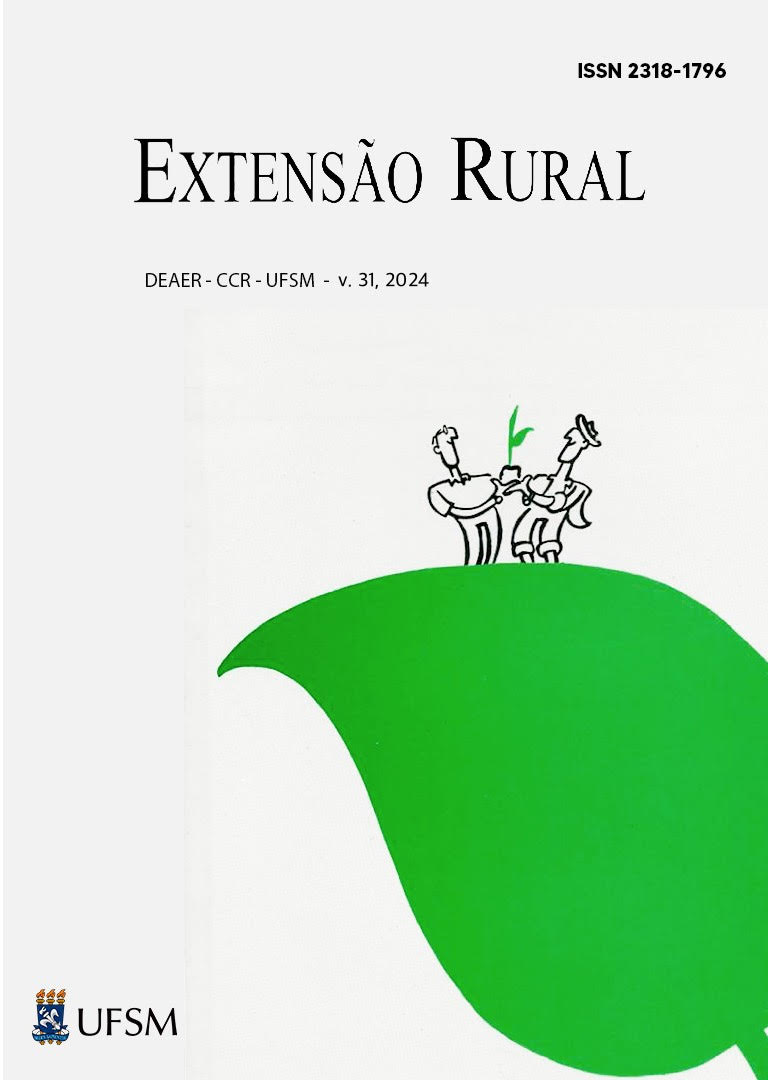We didn’t have capital, but we were really rich:
poverty and dignified lives narrated by black women settled in southern Brazil
DOI:
https://doi.org/10.5902/2318179685706Keywords:
Black women, Development, Local theories, Poverty, SettlementsAbstract
This essay problematizes the issue of poverty, trying to take the voices of settled black women seriously and recognizing them as local theories. The challenge was to gather clues about the ways in which notions of poverty erupt in the daily lives of women who live in territories associated with poverty that are invariably decoded as destitution. Through in-depth interviews, seven women who experienced the struggle for land with the Landless Rural Workers Movement (MST) in the Filhos de Sepé settlement in southern Brazil narrated their notions of poverty, misery, wealth, and life worthiness. Revisiting their memories, the women weave theories anchored in everyday struggles that resonate with a community ethic of sustaining the desired life. Connected with the land and the good taste of living, his reflections indicate the importance of an epistemic investment in the concepts of poverty and misery, as well as their abyssal differences.
Downloads
References
ANJOS, J. C. G. dos. No território da linha cruzada: a cosmopolítica afro-brasileira. Porto Alegre: Editora da UFRGS/Fundação Cultural Palmares, 2006.
ANJOS, J. C. G. dos. BRASIL: uma nação contra as suas minorias. Revista De Psicanálise Da SPPA, [S. l.], v. 26, n. 3, p. 507–522, 2019. Disponível em https://revista.sppa.org.br/RPdaSPPA/article/view/469. Acesso em: 16 Fev 2022.
ANGLADE, G. Éloge de la pauvreté. Montréal: ERCE Études et Recherches critiques d'espace, 1983. Disponível em: http://classiques.uqac.ca/contemporains/anglade_georges/eloge_de_la_pauvrete/eloge_de_la_pauvrete.html. Acesso em: 29 Ago 2020.
CABNAL, L. Acercamiento a la construcción del pensamiento epistémico de las mujeres indígenas feministas comunitarias de Abya Yala. In: CABNAL, L.; ASOCIACIÓN PARA LA COOPERACIÓN CON EL SUR. Feminismos diversos: el feminismo comunitario. España: ACSUR-Las Segovias, 2010, p. 10-25. Disponível em: https://porunavidavivible.files.wordpress.com/2012/09/feminismos-comunitario-lorena-cabnal.pdf. Acesso 05 abr. 2022.
CASIMIR, J. La cultura oprimida. Cidade do México: Nueva Imagen, 1980.
CYRINO, C. Sob o olhar do outro: o experimento do racismo científico nas missões brasileiras de instruir e sanear populações pesqueiras. In: PADILHA, L; MARQUES, P. M. (org.). Brasil e Haiti: Racismo, ciência, lutas históricas, dramas atuais. Porto Alegre: Editora Fi, 2020, p. 20-33.
ESCOBAR, A. La invención del tercer mundo. Caracas: El perro y la rana, 2007.
GLISSANT, É. Poética da relação. Rio de Janeiro: Bazar do tempo, 2021.
HOOKS, B. Pertencimento: uma cultura do lugar. São Paulo: Editora Elefante, 2022.
LOBATO, M. Contos completos. São Paulo: Biblioteca Azul, 2014.
GRAZIANO, X. Reinventar a reforma agrária. São Paulo: Folha de São Paulo Opinião. 08 maio 2004. Disponível em: https://www1.folha.uol.com.br/fsp/opiniao/fz0805200410.htm. Acesso em: 09 jul. 2021.
LANDER, E. (org.). A colonialidade do saber: eurocentrismo e ciências sociais. Perspectivas latino americanas. Ciudad Autonoma de Buenos Aires: Colección Sur Sur, CLACSO, 2005.
MACHADO, D. C. M. Estratégias socioeconômicas da agricultura camponesa: a trajetória de vida de uma família de agricultores no assentamento Filhos de Sepé, Viamão – RS. Monografia (Curso de Especialização em Agricultura Familiar Camponesa e Educação do Campo) - Universidade Federal de Santa Maria, Santa Maria, 2015.
MARQUES, P. M.; MACHADO, D. C. M. Pobreza e desenvolvimento: imaginários coloniais e insurgências teóricas desde o Sul. Desenvolvimento em Debate, [S. l.], v. 9, n. 1, p. 15-35, jan/abr. 2021 Disponível em: https://inctpped.ie.ufrj.br/desenvolvimentoemdebate/pdf/dd_v_9_n_1_pamela_marconatto-marques_e_dayana_cristina_mezzonato_machado.pdf. Acesso em: 13 jan. 2022.
MARTINS, L. M. Performances do tempo espiralar, poéticas do corpo-tela. Rio de Janeiro: Editora Cobogó, 2024.
MENESES, M. P. Epistemologias do Sul. Revista Crítica de Ciências Sociais, [Coimbra], v. 50, p. 5-10, 2008.
PASSOS, N. Os 30 anos de ódio ao MST da revista Veja. [S. l.]: Carta Maior, 2014. Disponível em: https://mst.org.br/2014/02/20/os-30-anos-de-odio-ao-mst-nas-paginas-da-revista-veja. Acesso em: 25 maio 2022.
PAREDES, J. Hilando fino desde el feminismo indígena comunitario. In: MIÑOSO, Yuderkys Espinosa (coord.). Aproximaciones críticas a las prácticas teórico-políticas del feminismo latino-americano. Buenos Aires: En la Frontera, 2010, p. 117-120.
RAHNEMA, M. Quand la misère chasse la pauvretè essai. Paris: Actes Sud, 2003.
RAHNEMA, M. The richest of the poor: An archeology of poverty. Paris: Fayard, 2001. Disponível em: https://www.pudel.samerski.de/pdf/majid.pdf. Acesso: 04 set. 2020.
RAHNEMA, M. Porvety. In: SACHS, W. The development dictionary: a guide to knowledge as power. London: Zed Books, 2010, p. 174-194.
SILVESTRE, H. Notas sobre a fome. São Paulo: Ciclo Contínuo Editorial, 2019.
SOUZA, R. Cria da favela: resistência à militarização da vida. Rio de Janeiro: NPC, 2018.
SPIVAK, G. C. Pode o subalterno falar? Belo Horizonte: Editora UFMG, 2010.
SPRANDEL, M. A. A pobreza no paraíso tropical: interpretações e discursos sobre o Brasil. Rio de Janeiro: Relume Dumará, 2004.
SPRANDEL, M. A. Nossos pobres ou nosso povo? Contribuição para o debate sobre políticas sociais no Brasil. Inclusão Social, Brasília, v. 1, n. 2, p. 83-87, abr./set. 2006.








